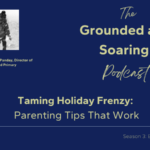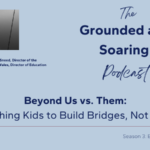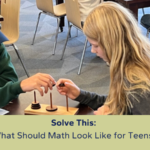Dear MMS Families,
Coincidentally, two of my best friends from our graduate school days went on to become deans at universities, one on the West Coast, one on the East. Speaking with them recently, both expressed great distress over the genuine and well-publicized mental health crisis among today’s college students. This includes a dramatic increase in rates of depression, anxiety, isolation, suicide, and suicidal ideation (It’s not only college students though: since 2000, suicides in the US. as a whole have increased by 30 percent.) Additionally, recent studies show that “Generation Z,” those born between about 1995 and 2014, are actually lonelier than our society’s elderly.For those of us still raising and educating children, it is imperative that we look boldly at this troubling reality and strategize accordingly. One of the most obvious problems is a misplaced sense of priorities. While this list could be a long one (e.g., valuing digital social life over human contact, connecting to the 24/7 bad news cycle, a culture of obsessive online comparisons, choosing constant digital connection over healthy sleep habits, “helicopter” and “snowplow” parenting approaches, etc.), it is becoming clear that a highly problematic and misguided approach is focusing on “happiness” and forgetting “meaning.Though they actually often overlap, this excerpt from “Meaning is Healthier than Happiness” in The Atlantic summarizes well the key differences between happiness and meaning:
Happiness was defined… by feeling good. The researchers measured happiness by asking subjects questions like “How often did you feel happy?” “How often did you feel interested in life?” and “How often did you feel satisfied?” The more strongly people endorsed these measures of “hedonic well-being,” or pleasure, the higher they scored on happiness.
Meaning was defined as an orientation to something bigger than the self. Researchers measured meaning by asking questions like “How often did you feel that your life has a sense of direction or meaning to it?” “How often did you feel that you had something to contribute to society?” and “How often did you feel that you belonged to a community/social group?” The more people endorsed these measures of “eudaimonic well-being” — or, simply put, virtue — the more meaning they felt in life.
Why does this matter so crucially for our children? It goes back to “grit.” Research reveals that those with meaning, with a well-developed sense of purpose in life, are more resilient. And, we now know well that resilience levels are one of the most accurate predictors of success in life. So, while happiness is ephemeral and dependent on circumstances meeting our wants, meaning connects us to values and relationships and histories that are deep-rooted. Meaning doesn’t always feel good in the moment, but its payoffs are invaluable. A classic example of this is the “parenthood paradox”: parents usually report great happiness at having children, but parents currently living with children usually score quite low on day-to-day measures of happiness. So, raising children will likely decrease moment-to-moment happiness, but increase meaning. Think also about the heroes whose lives we revere: many suffer through strife and deprivation in a struggle to reach high ideals, to live their purposes, purposes that bring them satisfaction and meaning in their lives and the lives of those who follow.
What are the implications of this for Marin Montessori and for you, our families? How do we guide our children toward the cultivation of meaning and purpose? Four priorities to commit and recommit to are clear:
1. Give them Focus: Low ability to focus is closely linked to high anxiety. Our lives today are busier and more divided and distracted. When our children have a sense of wholeness and integration though, they settle and feel less anxious and depleted. And, they have the time and space to discover deep-seated passions. As Barry Kaufman notes in Scientific American, “Years of research on the psychology of well-being have demonstrated that often human beings are happiest when they are engaged in meaningful pursuits and virtuous activities.” Indeed, when we are deeply engaged in an activity that is in accordance with our best self, we often report the highest levels of life satisfaction. As we know from research, students in authentic Montessori programs experience the highest levels of concentration and report more positive emotions, higher energy levels, stronger internal motivation to do their work, and less distraction. (You can read more about this here.) Developing in our children the robust ability to focus helps them discover purpose and inoculates them against anxiety.
2. Invest in Relationships: Close in-person connections are what we are wired for. The qualities of our human relationships impact our sense of meaning. With belonging we feel empowered to enter the world, buoyed by the knowledge that we are seen, loved, and supported. Given the levels of loneliness in our youth and society as a whole, this is urgent. When I think of the power of belonging, I’m reminded of an activity one of our elementary teachers told me about: a student was going through a rough patch and acting rather chaotically and even rudely. The class sat in a circle, and each student took a turn making eye contact with this child and telling him what they see in him that is good and admirable. The experience reminded this child of his best self, and it brought it back alive in him. He was reminded that he has a tribe of peers who have his back, and he rose to meet their positive regard.
3, Give them the Gift of Nature: The research keeps shouting this: developing a relationship with the natural world provides physical health benefits (e.g., reduces risks of type II diabetes, cardiovascular disease, premature death, preterm birth, stress, and high blood pressure) and mental health benefits (reduced levels of anxiety, depression, stress, and fatigue). Especially since today’s youth have less downtime–both because they stay hyper-digitally-connected and because they are busier– teaching them to value taking downtime in the natural world, and allowing them to sense their relationship with this larger world, will be a gift that keeps giving for their lifetimes.
4. Don’t Equate External Approval with Internal Worth: Do we message to our children that their value is equated with how others evaluate them (e.g., from whether they make the “A” or “B” basketball team, to whether their Instagram posting gets “likes,” to whether the college they go to is “most selective” or just “selective”)? In the end, if we live our lives mostly in reference to gaining others’ “likes,” then we will have lives filled with anxiety and self-doubt. Honor and recognize and celebrate our children’s gifts. And, help them see realistically their weaknesses and motivate them to improve (i.e., “Failure can be just a stepping stone to success”). We know the ability to honestly and accurately self-evaluate our strengths and weaknesses is a skill that is connected to high degrees of resilience, self-regulation, “growth mindset,” and success.
In my first few months at Marin Montessori, a parent sent me this Howard Thurman quote with a note: “This reminds me of MMS.” On the first day of this New Year, let’s read it together, take it in, and celebrate the many good fortunes we share as a community dedicated to raising children and adolescents who flourish:
“Don’t ask yourself what the world needs. Ask yourself what makes you come alive and then go do that. Because what the world needs is people who have come alive.”




